broadband
Latest

MyLiFi lamp delivers secure internet via LEDs
MyLiFi is a lamp that provides a secure, wireless, radiowave-free internet connection to nearby devices, all through the data-transferring power of LEDs. It's a simplistic, industrial-style desk lamp that beams broadband to a dongle, which users connect to their laptops or mobile devices -- and boom, they have secure, fast internet. Data is transferred between the bulb and the dongle via invisible, blinking LEDs, which means the lamp doesn't need to be on in order to provide a connection.

All 50 states opt in to AT&T’s FirstNet public safety network
FirstNet, the nationwide broadband network for first responders, will be the official public safety network for all 50 US states. The network has been a very long time coming. Having been initially proposed following the 9/11 attacks, the FCC approved LTE to be the standard on which it would function back in 2011. In March, AT&T was selected by the First Responder Network Authority to build and run the network and in June, the company began sending its plans to state governments for review. States had until yesterday to decide whether they would opt in or out of the program and all 50 decided to approve it. Washington DC, Puerto Rico and the US Virgin Islands also opted in while American Samoa, Guam and the Northern Mariana Islands have until March 12th to make their decisions.
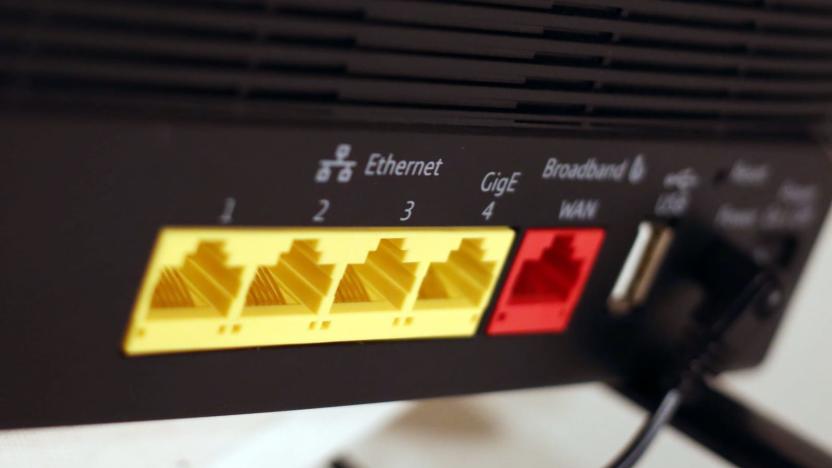
The UK decides 10 Mbps broadband should be a legal right
Over the past decade, the UK government has attempted to lock in a basic level of broadband service across Britain. The idea is that by 2020, members of the public will have the legal right to request speeds of at least 10 Mbps from their ISP, whether they happen to live in a big city or in the countryside. It's all part of the government's Universal Service Obligation (USO), which was laid out in the Digital Economy Act passed earlier this year. Ministers originally considered adopting BT's voluntary offer, which would have seen it spend up to £600 million giving 1.4 million rural residents access to speeds of at least 10 Mbps. However, in a statement today, the government confirmed that it now will go down the regulatory route as it provides "sufficient certainty and the legal enforceability that is required to ensure high speed broadband access for the whole of the UK by 2020."

Verizon will launch 5G home internet access in 2018
Verizon's 5G wireless will soon become a practical reality... if not quite the way you might expect. Big Red has announced that it's launching residential 5G broadband (that is, fixed-in-place wireless) in three to five markets starting in the second half of 2018. Most details aren't nailed down at this point, but the rollout will begin in Sacramento, California.

UK watchdog tells ISPs to advertise ‘real’ broadband speeds
Broadband packages are notoriously difficult to untangle. Prices are obscured with introductory discounts and the speeds you get are nothing like what was advertised. It sucks, and the UK's Advertising Standards Authority (ASA) knows it. So today, the watchdog has announced new rules for broadband advertising. From now on, the figure you see must be based on the download speeds available to 50 percent of the company's customers at peak hours. In addition, a qualifier like "average" must be visible. It's a marked improvement over the previous guidelines, which said speeds must be available to at least 10 percent of customers.
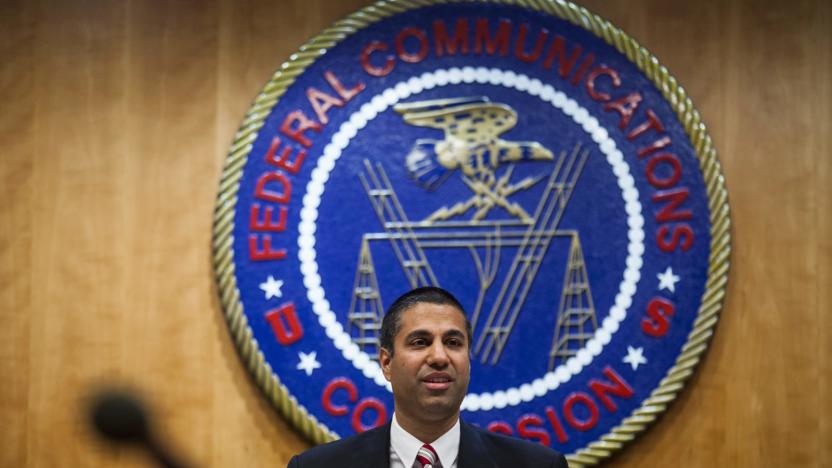
FCC releases the final draft of its proposal to kill net neutrality
The FCC has released the final draft of its proposal to roll back 2015 net neutrality protections. If enacted, the order would reclassify broadband internet service as an information service and Title II regulations would no longer apply. Additionally, blocking, throttling and fast-laning of content would no longer be banned and paid prioritization practices would be allowed as long as they're explicitly laid out by internet service providers. Further, any state-level regulations that contradict the FCC's order would be preempted.
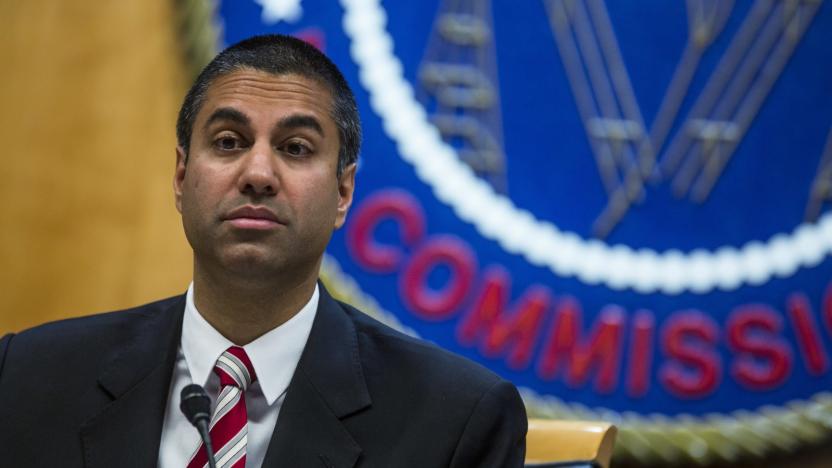
What to expect from the FCC's net neutrality proposal
Today, senior FCC officials outlined the net neutrality draft proposal that will be released by the commission tomorrow. As has been discussed for months, if the new proposal is accepted by the FCC, broadband internet service will cease being subjected to Title II regulations and will return to an information service classification rather than a telecommunications one. Additionally, the order would fully repeal the FCC regulations allowed by the internet conduct standard put in place in 2015, which let the commission investigate practices like zero-rating schemes -- AT&T's Sponsored Data and Verizon's FreeBee Data 360 setups, for example -- and would get rid of the bright-line rules that prevented internet service providers (ISP) from blocking, throttling or fast-laning certain content.
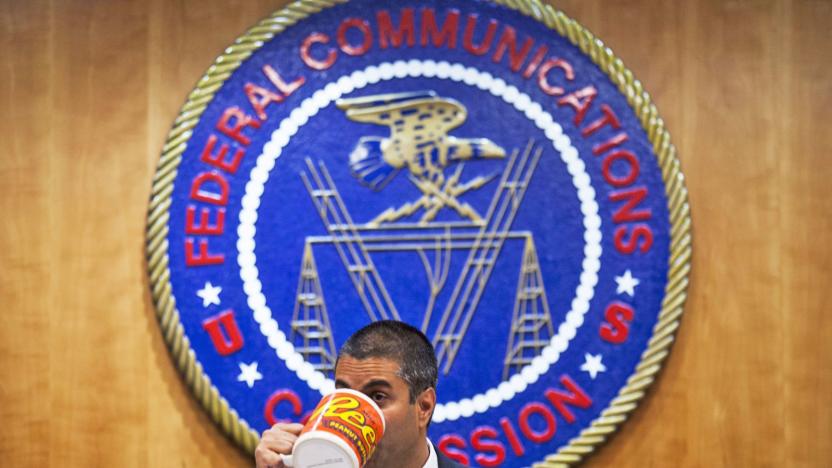
FCC vote could force low-income households offline
Bootstrapping yourself out of poverty via the internet is about to get a lot harder in the US. The FCC, led by industry-friendly chairman Ajit Pai, has voted along party lines to reform the low-income Lifeline broadband subsidy program. Among the most contentious items are a proposal to tighten eligibility requirements and cap spending, and another to halt subsidies through internet resellers like Windstream. If voted through, the latter proposal could force over 70 percent of Lifeline enrollees to seek a new provider, and many would have no option at all.

UK ISPs will automatically compensate customers for shoddy service
A poor level of customer service shown by your broadband or landline provider is like a late train. You know you could probably argue your way into some nominal refund, but it just seems more trouble than it's worth. The issue with that is there's no incentive to ensure the train runs on time, so earlier this year, Ofcom floated the idea that telecoms providers should compensate customers for poor service automatically, no complaints necessary. Today the regulator announced that BT, Sky, TalkTalk, Virgin Media and Zen Internet -- which cover 90 percent of broadband and landline customers between them -- have "agreed" to be part of such a scheme.
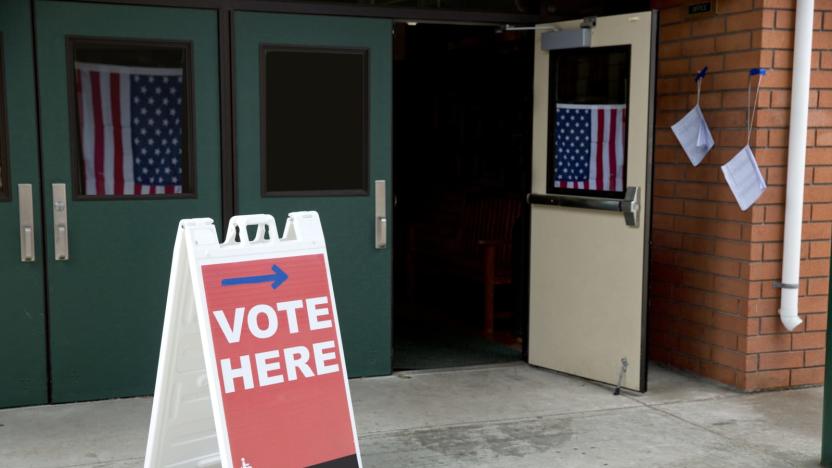
Colorado voters really want city-run broadband service
Internet access and quality varies widely depending on where you live in the US. There's a huge rural broadband gap that the FCC, companies like Microsoft and the Trump administration have said they'd like to close in the coming years and as Cleveland's situation shows, service can be drastically different even within the same city. One solution that has been proposed as a fix for spotty or inadequate broadband service is city-run internet, and it's one that Colorado communities are continuing to back.

Vodafone teams up with CityFibre to offer gigabit broadband
Despite there being healthy competition over broadband deals in the UK, its infrastructure is dominated by two players: BT (Openreach) and Virgin Media. It means that the majority of internet service providers are forced to lease BT lines, which restricts their ability to offer a unique service. Vodafone sits in the unique position of owning a small amount of its own backhaul, after it bought Cable and Wireless back in 2012, but still largely relies on BT. That looks set to change after the company confirmed today that it's teaming up with CityFibre, the UK's largest wholesale fibre provider, to sell its service on new CityFibre broadband installations for an exclusive period of time.

BT is increasing its broadband prices in January, again
It's far from unusual for the cost of subscription services, from Netflix to your mobile tariff, to increase from time to time, particularly to reflect inflation. BT doesn't seem too concerned with what's usual, though. After increasing prices in July last year, and again this past April, BT has said the next round of hikes will go into effect on January 7th, 2018. That's three price rises in just 18 months.

Twisted light could make wireless data faster than fiber
As fast as fiber optic lines have become, they're still hamstrung by one key limitation: you still need to transmit that data over wires, which limits where you can transmit and the affordability of the fastest connections. Scientists may have a way to eliminate those cables while offering even faster speeds, though. They've discovered a way to 'twist' photons in a way that not only crams more data into each transmission, but survives interference from turbulent air. If you pass light through a special hologram, you can give photons an optical angular momentum that lets them carry more than just 1s and 0s -- and so long as the light's phase and intensity are right, you can reliably beam that data over long distances.

'Hovering' antennas promise speedy 5G phone networks
Wireless networks already have to deal with increasingly crowded waves, and that's only going to get worse when 5G rolls around. Any boost to the signal could lead to a big jump in performance, especially when you're using very high frequencies that are more prone to interference. But how do you provide that boost? Researchers have an idea: 'hover' the antenna. They've developed millimeter wave antenna arrays that are almost entirely separated from the substrate you'd usually mount them on, preventing that substrate from weakening the signal like it does with conventional antennas.

Verizon cutoffs mark an uncertain future for rural customers
Last week, some Verizon customers in rural areas received unexpected news. The carrier would be terminating their service as of October 17th because they were using a "significant amount of data while roaming off the Verizon Wireless network." These users were roaming because their "primary place of use" was outside the company's service area.

You have 30 more days to tell Ajit Pai not to neuter broadband
While it's attacking net neutrality, the Federal Communications Commission (FCC) is pushing a second proposal that could also limit internet freedom. Under Tom Wheeler, broadband was redefined to mean 25Mbps download and 3Mbps upload speeds, but Pai's FCC wants to change that to include mobile networks with meager 10Mbps/1Mbps speeds. That hasn't been as well-publicized as the Title II issue, so many folks aren't aware that the comment period expires tomorrow. After a letter from 12 Democrat Senators urging an extension, however, the FCC agreed to prolong it by 30 days.
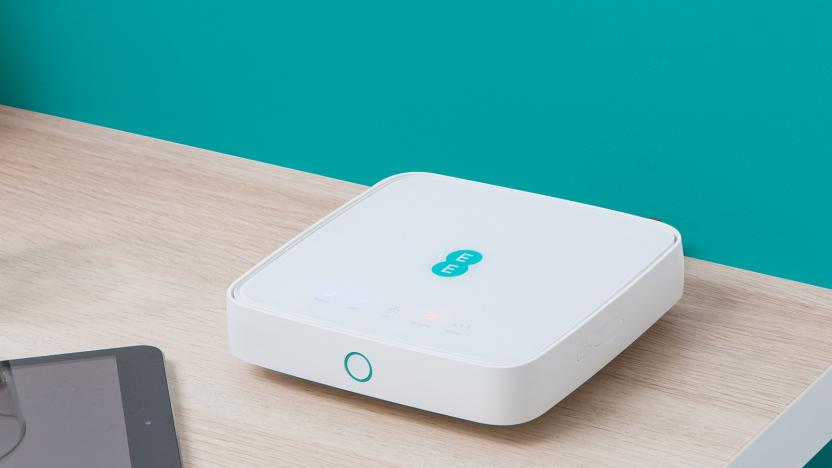
EE's new broadband router is a 4G MiFi for the home
EE and parent company BT both offer fixed-line broadband services already, but today EE is launching a new router that uses 4G to keep the whole household connected. The "4GEE Home Router" is basically a bigger, beefier MiFi that needs no formal installation. Just plug it into a power outlet, connect your phones, tablets and PCs to it via WiFi -- up to 32 devices are supported -- and enjoy download speeds of up to 90 Mbps (actual speeds will vary, of course).
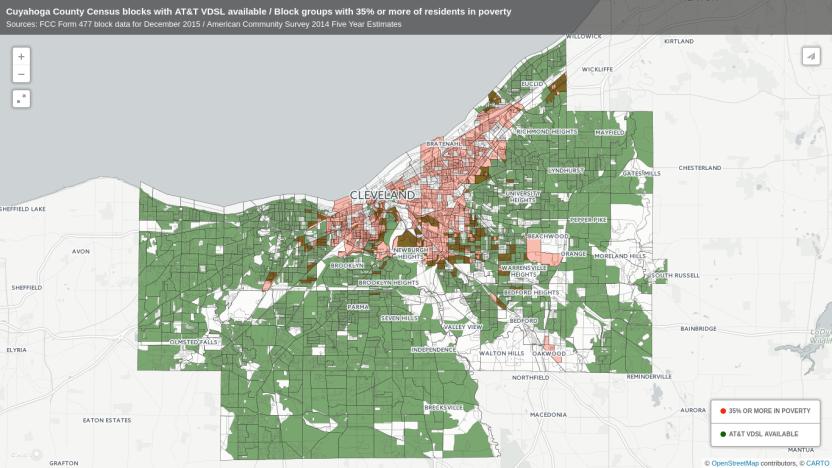
Cleveland residents take AT&T broadband complaint to the FCC
In March, two organizations -- Connect Your Community and the National Digital Inclusion Alliance -- alleged that AT&T had been practicing "digital redlining" in lower income Cleveland neighborhoods. The report released by the groups presented evidence showing that AT&T had not upgraded its broadband infrastructure in those neighborhoods though it had done so nearly everywhere else in the county. Now, a formal FCC complaint has been filed against AT&T.
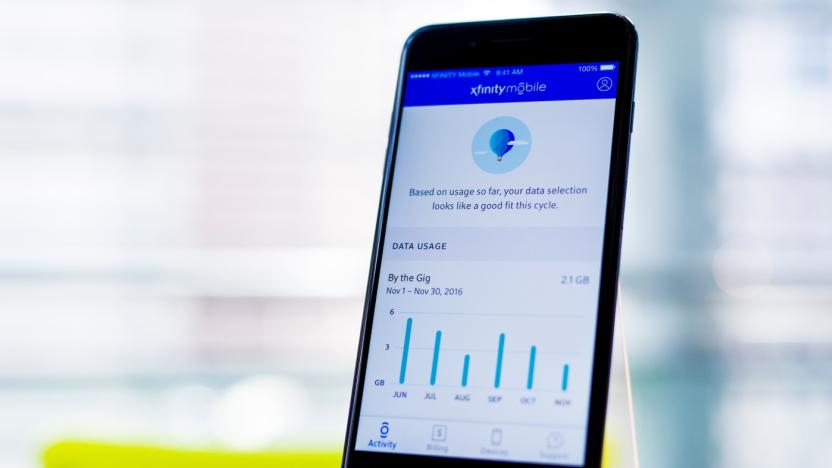
Xfinity Mobile arrives to all of Comcast's markets
If you're using Comcast's Xfinity internet service anywhere in the US, you can now get on the company's Xfinity Mobile service, too. Just over four months after it was first revealed, Comcast has completed the rollout of the service (powered by Verizon's network) "across all of its sales channels," it says. Comcast has since simplified the plans, and now simply offers either a $45 per month "unlimited" offering, or $12/GB if you'd rather go à la carte.

FCC wants mobile data to count as broadband internet
The FCC under Chairman Ajit Pai is signaling new broadband policy changes that can only be described as friendly to ISPs and hostile to consumers. In a "Notice of Inquiry," a public comment step often taken ahead of rule changes, the commission proposes that both fixed and mobile can be counted as broadband under Section 706 of its rules. That differs from the current standard, developed under Tom Wheeler, that requires timely deployment of both wired and wireless networks in the US.







